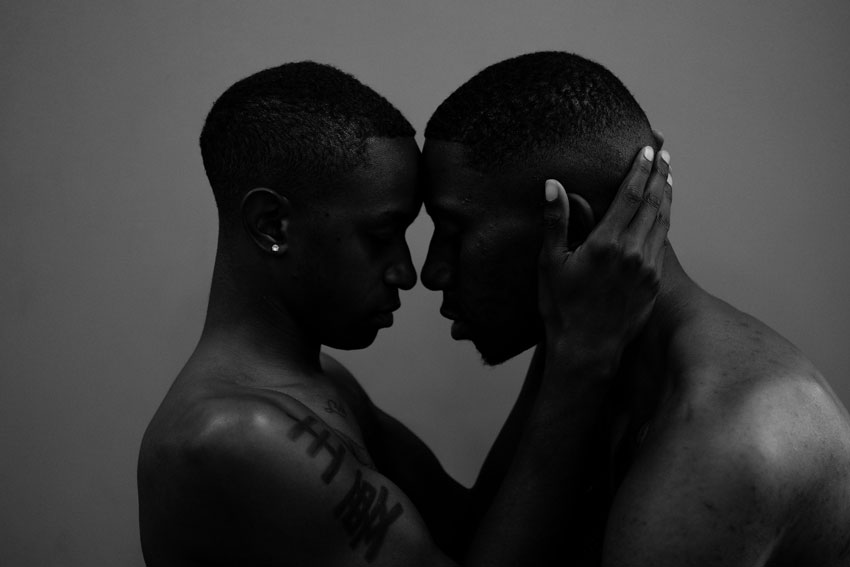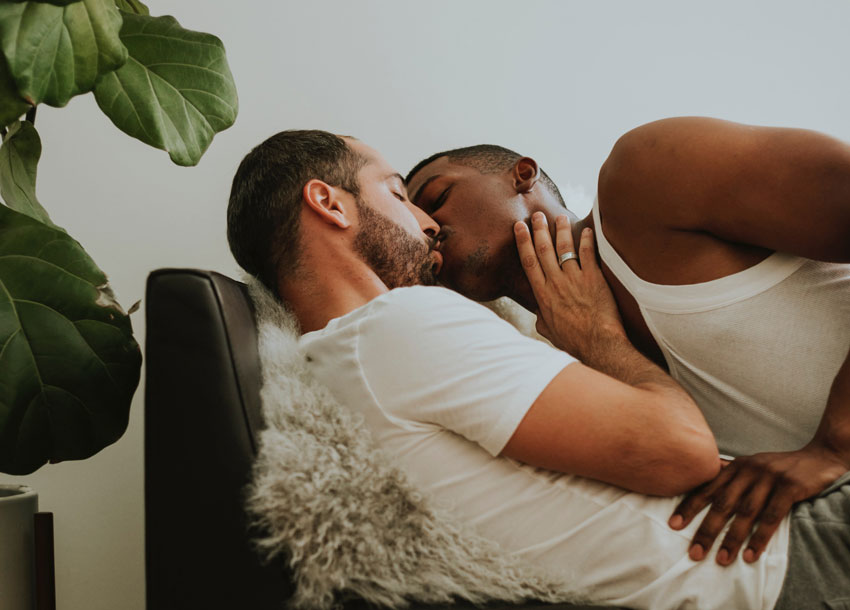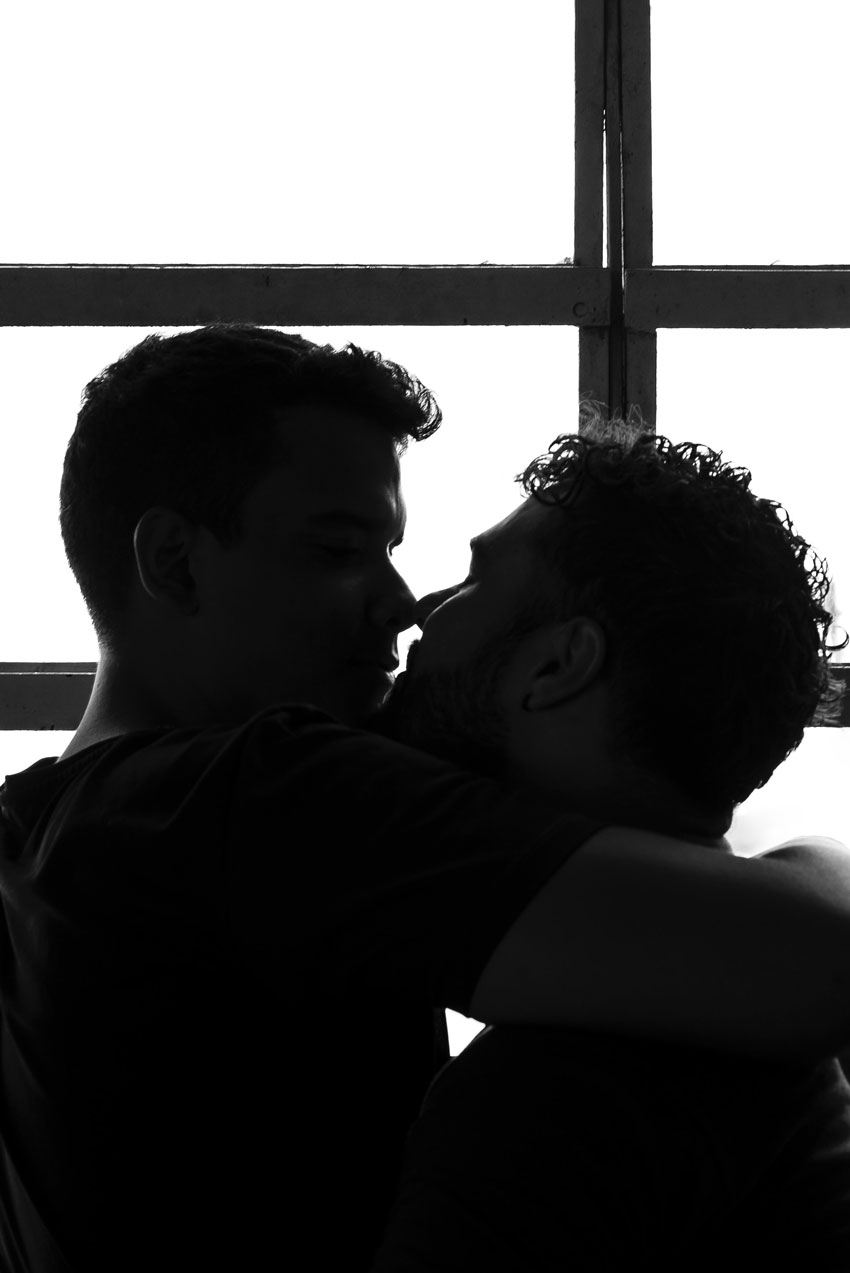Gay Slut Shaming & The Compartment of Secrets

Let’s be honest with ourselves. We all become someone else when we have sex. Maybe you’re a bit primal and bite. Your friends might be surprised you’re an aggressive power top given your mild-mannered demeanor. Your voice may even drop a few octaves when it’s time to get down. There’s nothing wrong with that. Sex is private. We are sharing a private part of ourselves for our sex partners. After all, we’re naked. There’s bound to be some emotional and behavioral differences in our behavior. The pressure to be the masculine ideal, internalized homophobia, misogyny and the Puritanical values of this country can subconsciously sneak into our sex lives. They can cause a further split with who were are in the streets and in the sheets.
Most men compartmentalize sex. Compartmentalizing is how we handle complex emotions. As men, we don’t often get the space or freedom to fully express our emotions. We put certain emotions in “compartments” to be able to handle them. Sexually there’s a split. There’s Dr. Jekyll and Mr. Horny. But how much of these are healthy boundaries vs. repressing our emotions to suit other people? How much of it is performing within a patriarchal paradigm? Is this hurting us?
There are psychological proof men compartmentalize sex. There’s the psychological concept of the Madonna/Whore complex. Essentially, a straight man wants a Madonna figure, Virgin Mary not “Like a Virgin,” to be his wife. She’s pure and fit to raise his children. But sexually he wants a whore he can degrade and get nasty with. This split permeates straight culture. The Handmaid’s Tale literally has their Madonna and Whore figures color-coded. But this isn’t just for straight men, anymore.
I call the queer version, the Ken Doll/Porn Star complex. When it comes to dating, gay men want a Ken doll. He is their idealized partner. He’s got the good looks, the right smile, the right job, and is completely asexual at the start of the relationship. Waiting to have sex is perfectly healthy. But forcing a sexual separation from your romantic interest seems messy. You want to be able to have a relationship with someone that’s both romantic and sexual. On the flip side, gay men who are sexual are expected to be porn stars. We’re held to the standards of porn to exhibit our prowess and fulfill our partners’ fantasies. To a certain extent, this is also how we navigate the world.

As queer people, our sexuality is so closely tied to our identity. It’s what makes us different from our straight counterparts. It can affect how we are treated by strangers. And yet, we can’t talk openly about it. We often must put on a neutered “Ken Doll” demeanor to navigate the straight world. We are expected to be perfect gay ambassadors. We keep it light and nonsexual at work, in social situations, around straight friends of friends. We smile as they yell “Yas queen” and put us into boxes. We graciously dodge intrusive sex questions with a smile on our face. In short, we repress. There are parts of our life we dare not express in the company of straight people. They just wouldn’t get it. Can Deborah from Accounting understand you’re sad because your friend saw the guy you’re dating at a bathhouse? Can your buddy Jeff understand the emotional rub of two of your exes dating each other? Does anyone know how to process the weird feeling of suddenly being confronted with marriage as an option?
Meanwhile, in the gay world, since it’s the one space where we can be sexual, sex permeates the atmosphere. You end up in situations where sex can happen before having small talk. Grindr conversations become like job interviews for porn. We’re asked what we are willing to do, expected to send full-body nude photos and negotiate our sexual encounters. We’re confronted not with straightforward sex but elaborate expectations. Why can’t we be both a sexual being and a human being?
As we split parts of ourselves we dilute who we are. Marginalized people code-switch, i.e. alter their behavior, depending on who they are around. It’s a given that you’re different around co-workers, your best friend, and a stranger on the street. In some ways, this is a healthy survival tactic. In other ways, it’s us compromising our identities. After all, if we are part of the system we should be able to change it. The key is to integrate these two sides of ourselves. We must become whole…not a hole.
Can’t we be the same person we are socially with who we are sexually? I am not talking about being sexual socially. Keep your clothes on! I am talking about balance. We should be able to freely express ourselves emotionally in and out of the bedroom. There are healthy boundaries and then there’s repression. Oftentimes we do not talk about our dating lives or the men in our life because of shame or the fear of being shamed. So much of our culture, given its Puritan history, is about shame. You get shamed for being “rude.” We can internalize shameful attitudes about our body, our sexuality, and other random insecurities that get drilled into us by schoolyard bullies, our families, or the media. We can even go so far as to start shaming other people. Slut-shamming is a popular buzzword for shaming the sexual expression of others often to control their behavior.

When we internalize this shame it furthers our split. We can have emotions like anger and resentment that can come out during sex. We can internalize that shame as negative visions of ourselves leading to low self-esteem, depression, and addiction issues. The repressed feelings we take on from shame can cause a shift from sex being an expression of intimacy and a shared experience. That further pushes us away from potential romantic prospects.
Homophobia is on some level socially-constructed slut-shamming. Our sexuality does not conform to the expectations of society, so we are judged harshly because of it. Religious people speculate on what we do in the bedroom and decide we are inferior because of it. As evolved and educated as we might be, it can be hard to avoid the feelings that come up from this. This shame can stick with us. Sex becomes tied to “secrets.” Also, the emotion driving the sex bus is not sexual desire but sexual desire drunk on shame, fear, or other repressed emotions. This can condition us to keep our feelings secret rather than be open and upfront with our partners. We can minimize our sexual needs and not ask for what we want. Meanwhile, we can start having sex for the wrong reasons or need substances to let our guard down to have sex.
The issue with slut-shaming is that you are forcing your judgment of what is appropriate onto someone else’s behavior. Meanwhile, this is likely based on your experiences, values, and upbringing. Oftentimes, we put this focus on others rather than examine the ways our upbringing or “expectations” are wrong or unhealthy. It can take deep emotional work and processing to get to a healthier place with ourselves. It’s easier to assume the problem is with other people and not with us. But our attitudes affect our environments as much as our environments affect our attitudes.
Slut-shaming can happen when we are trying to date someone. People had lives before you met. In my past, I’ve been slut-shamed by potential partners for having had “too much” sex. Growing up in a large city that’s more of an option. But being sexual does not mean you can’t commit to a serious monogamous relationship. Being sexually inexperienced or having only been in long term relationships doesn’t guarantee fidelity. Honesty and establishing healthy boundaries are the key to making a sustainable relationship. There is no perfect Ken doll in a box waiting for you.
We all have individual sex lives. Our views on sex are just as individual. The issue is when we put those expectations on others. That’s what’s wrong with society. We are disempowering or emasculating someone based on our own issues. We are projecting our discomfort, shame, negativity or judgment onto someone else’s behavior. That isn’t really our business. We can be sex-positive, inclusive, and tolerant but we aren’t perfect. Also, there is no “right” way to behave. Many gay men may have undiagnosed sexual addiction issues or their own barriers to intimacy. Other people can just have really large sex drives. The key is to have conversations. Boundaries between queer people can be amorphous. How do you act around a friend if you are suddenly both half-naked at a party? How does your sex persona interact with someone else’s sex persona?

The key is to use the fact that we are sexually free to have frank conversations. Not just about sex but relationships, boundaries, and our collective experiences. Only we can help define the life and relationships we want. And only through communicating can we discover the keys to ending our issues. Talking about the narratives we hold onto and the mindsets we use to navigate the world can help inspire others. It can also help us get called on our bullshit.
The same way we can be brazen sexually we should be brazen with our boundaries. If someone says something I don’t want to hear I change the subject and move on. Internalizing what you don’t want is not a valid use of your time, energy, or mental real estate. If someone crosses a boundary I let them know. The key is to be firm but also compassionate. It can be easy, when you’re hurt, to assume people want to hurt you. But we all have a sad little gay man inside us. Some may have a woman. But the key is we’ve all been hurt, alienated, left out, or shamed.
The key to ending the slut-shame game is to stop playing along. There is no one way to be. As people marginalized by the “morality” of others, we can only succeed if we are more tolerant … especially since our community is so diverse. We can all afford to communicate more clearly with what we are okay with and not okay in and out of the bedroom. We can challenge ourselves by showing up as our most authentic selves in all aspects of our lives whether it’s in the office, in the bedroom, or with strangers. We also must make sure that our slut-shame isn’t a tool to shift blame from people who hurt us in the past onto people who are in our present.
We should be honest with someone if they are crossing our boundaries. But the first step is setting a boundary not shaming someone for crossing it. We should be honest with how someone’s behavior makes us feel. That moment of vulnerability allows someone to empathize and alter their behavior out of mutual respect rather than shame, embarrassment, or power plays. We also have to be honest with ourselves. Are we acting more sexual, less sexual, or judgmental with someone because of something going on inside ourselves? This work is worthwhile because it helps us merge our sex lives with our regular lives so we can live our best lives.
Christian Cintron is a writer, actor, and stand-up comedian. He has written about entertainment and gay culture for Edge Publications, Queerty and DNA Magazine. He’s also a regular contributor to Backstage.com.
Check out his website www.christiancintron.com. // YouTube: CintronicComedy // Twitter: AbsoluteCintron // Instagram: @SighKickScream
